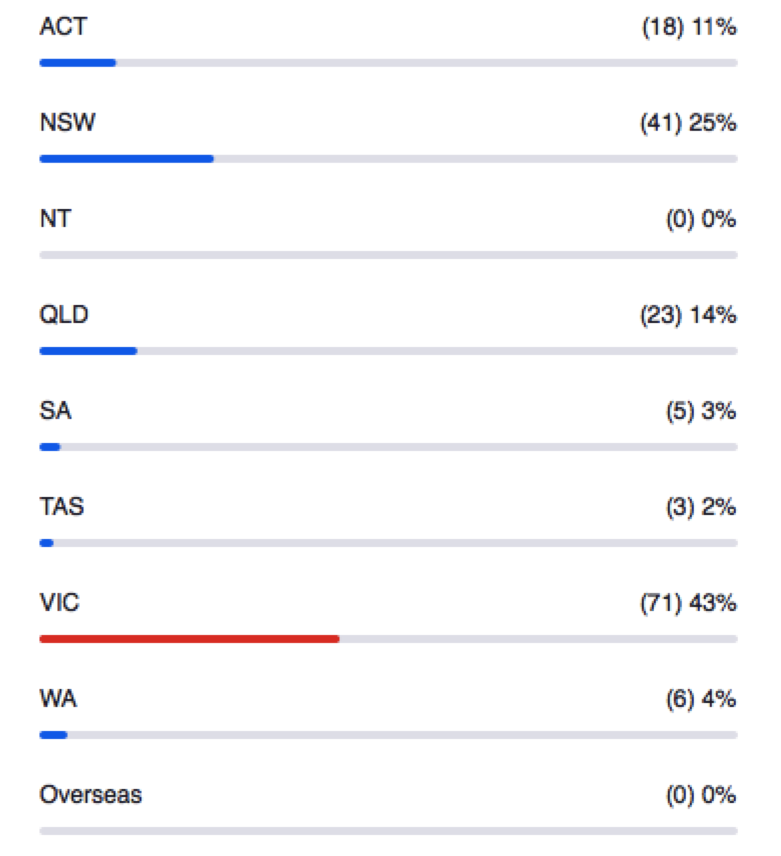Stephanie Georgiou & Maddy Oh Tuesday 9 February, 4-5:30 pm Online Event Presenters: Stephanie Georgiou has more than 18 years of experience in teaching EAL. She has worked in the...
Read the December VicTESOL eBulletin online now.
Click here to read online.
And if you would like to subscribe to receive future updates please click here.
IMPORTANT INFORMATION FOR AMEP TEACHERS
Alison Larkins, Commonwealth Co-ordinator General for Migrant Services, provided an important briefing for AMEP teachers in a webinar hosted on 11thNovember. Click here to access the recording.
The AMEP team in the Department of Home Affairs is currently considering the questions raised during the webinar and their response will be posted on the ACTA website once it becomes available. Please refer to the file below to view the questions posted in the Q&A box in the webinar.
Ms Larkins and the AMEP team in the Department of Home Affairs have generously agreed to a second on-line meeting early in March 2021. The aim of the meeting will be for Alison and the AMEP team to listen to participants’ ideas around some of the key issues raised at the last meeting.
Key questions will be circulated before the meeting. The meeting will consist of break-out groups to discuss the questions, followed by reports back to the whole meeting and discussion.
Further details as they become available will be on the EVENTS page on the ACTA website.
For further details, please watch this space!
Read the November VicTESOL eBulletin online now.
Click here to read online.
And if you would like to subscribe to receive future updates please click here.
The VicTESOL early childhood and education series will focus on families and communities as a resource for growing and strengthening the development of bi/multilingual children. Registrations are now open for this 2021 professional learning opportunity!
Register Now!
- Wednesday 17th February 2021 6pm AEDT Caroline Cohrssen: Leveraging Languages for Learning
- Wednesday 17th March 2021 6pm AEDT Susie Garvis & Heidi Harju-Luukkainen: Building ECEC across the Nordic Countries- From Policy to Practice
- Saturday 17th April 2021 10am AEST Shelly Stagg Peterson: Story Drama, Talk, and Writing in Northern Canadian Rural and Indigenous Classrooms

Luke Treadwell & Tanja Rykovska, AMES Australia
Wednesday 18 November, 4:00-5:30pm AEDT
Online Event
This workshop was based on the premise that digital literacy is vital for living, learning, and working in contemporary Australian society and therefore needs to be a key feature as both a support and an outcome of any relevant EAL program. The session detailed the experience and learnings of one such program that was specifically designed (pre-COVID) to engage low level EAL learners in online learning. The session covered the basic course design principles of our EAL online courses, the strategies developed to engage and support the learners and their challenges and achievements learning in an online environment. Luke and Tanja’s presentation was followed by Q&A and small group discussion.
Luke Treadwell is a senior teacher with many years of program and proect management in AMES. Luke has taught EAL students for many years across many programs and has recently worked extensively with ASMES online learning program.
Tanja Rykovska is an EAL teacher with extensive experience teaching English, designing and delivering EAL programs in various settings and for diverse cohorts. She has a special interest in technology in language learning and has integrated technology in her teaching throughout her career. She has been involved in AMES online learning initiative since 2015.
If you want to find out more, here is the link to the AMES Course Taster: https://ames-sandbox.mrooms.net/course/view.php?id=51
VicTESOL Annual General Meeting & End of Year Celebration
Online Event – Guest Speaker: Ester de Jong
Thursday 3 December 2020, 5.30 – 6.30pm AEDT
At the AGM we will hear about VicTESOL’s achievements from the last year, share in awarding the 2020 VicTESOL Research Grant to the successful applicants and hear from the guest speaker, Ester de Jong, Director of the School of Teaching and Learning and Professor in ESOL/Bilingual Education, University of Florida.
https://esterdejong.com/
There will be time for some Q&A following her presentation.
RSVP: Click here to register to attend the VicTESOL AGM
RSVP by 26th November 2020
Please email victesol [at] victesol.vic.edu.au to request:
- 2020 AGM Agenda
- VicTESOL Committee Nomination Form
- VicTESOL Committee Nomination Proxy Form
2019 & 2020 VicTESOL members are able to access the 2019 VicTESOL AGM Draft Minutes by logging on to the VicTESOL website and clicking here.
Please note: all nomination and proxy forms must be emailed to VicTESOL by 5pm, 26th November 2020.
Webinar Event – Wednesday 11th November 2020, 7-8pm AEDT
Learn about the Commonwealth Government’s vision for English language provision for adult migrants
Presenter Alison Larkins was appointed in late 2019 as Commonwealth Coordinator-General for Migrant Services. Her role is to work closely within the Commonwealth and State/Territory governments, industry, and the community sector to drive improvements to employment, English language, and broader settlement outcomes, and through this work, to promote the contribution of migrants, refugees and humanitarian entrants to Australia.
Experienced AMEP teachers Jakki Cashman (Canberra) and Skye Playsted (Queensland) provided brief responses, followed by audience questions.
Thank you to everyone who attended the forum ‘English for Adult Migrants – Future Directions’ with Alison Larkins. The response to this event was overwhelming. Registrations closed at our limit of 500 and 374 people attended. Data on registrations and attendees are as follows:
REGISTRATIONS – Teaching Focus
AMEP: 328
AMEP & SEE: 106
SEE: 29
Teacher education: 18
Training to teach TESOL: 34
Other (with no other ID): 82
Note: some people listed more than 1 focus.
ATTENDEES – Locations
Which state/territory are you joining this webinar from today?

Are you based in a regional or metropolitan area?

If you attended the event, please click here to complete the evaluation survey.
Alison Larkins
Commonwealth Coordinator-General for Migrant Services, Department of Home Affairs

Jacky Springall Tuesday 10 November 2020, 4:00-5:30pm AEDT Online Workshop This practical workshop was based on the premise that EAL teachers need to be pro-active in integrating a focus...
Wednesday 28 October, 4-5pm
Panel Discussion and Q&A
Laurence Guttmann, Rosemary Abboud, Margaret Corrigan, and Julia Lippold
Some resources that were shared within this session:
- Carringbush Education teacher training videos which are available at: https://www.carringbush.org.au/resources
- Foundation House: https://sifr.foundationhouse.org.au/ and https://foundationhouse.org.au/ There is an upcoming Calendar Professional Learning Session ‘Introduction to the Refugee Experience/Schools in for Refugees’ on November 19th 9:30 – 12:00. You can register here https://learn.foundationhouse.org.au/workshops/
- Choi, J., & Ollerhead, S. (Eds.). (2018). Plurilingualism in teaching and learning: complexities across contexts. New York: Routledge.
- VCAA Video Resources: https://www.vcaa.vic.edu.au/curriculum/foundation-10/resources/english-as-an-additional-language/Pages/EALImplementationVideoResources.aspx
- Gibbon, P. (2015). Scaffolding language, scaffolding learning: teaching English language learners in the mainstream classroom. Portsmouth, NH: Heinemann.
- Swan, M., & Smith, B. (2001). Learner English: A Teacher’s Guide to Interference and Other Problems. Cambridge: Cambridge University Press.
- EALD Learners are Plurilingual: https://www.education.vic.gov.au/school/teachers/support/diversity/eal/Pages/EALD-learners-are-plurilingual.aspx
- PETAA (The Primary English Teaching Association Australia) – PETAA Papers: Pen 95 ‘What is a functional model of language?’ By Robyn Ewing
- Dr Jenny Barnett’s webinar on graduate EAL teacher standards: https://victesol.vic.edu.au/index.php/2020/09/08/meeting-graduate-standards-for-working-with-eal-d-learners-dr-jenny-barnett/
- Dr Sue Ollerhead’s (Macquarie University) webinar- Translanguaging in the Classroom (Please note: This is a VicTESOL member resource – Click here to become a member – Free for students and teachers in their first year of teaching)

